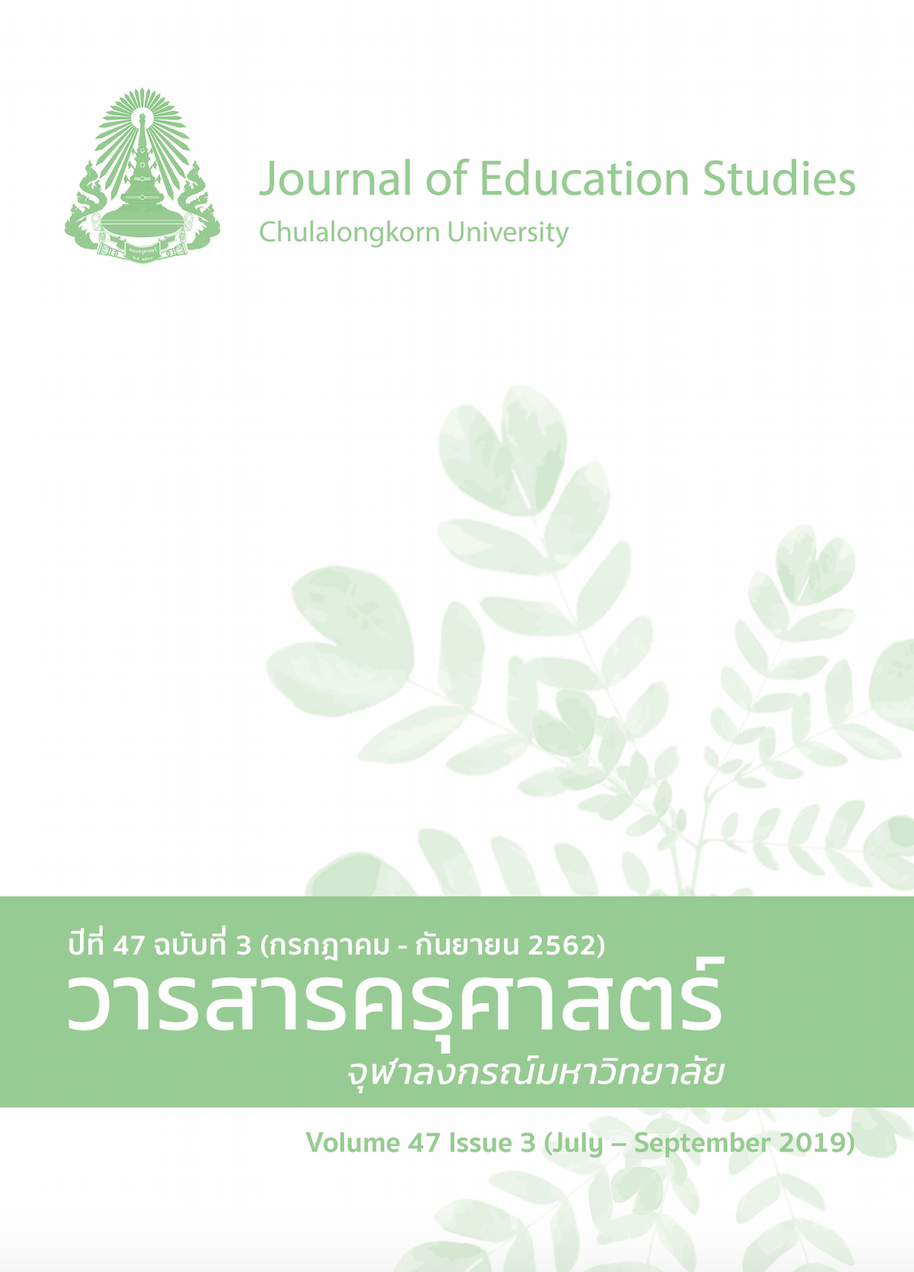A Development of Instructional Process in Free Play Activities Based on Tools of the Mind and Brain Based Learning Approaches to Enhance Executive Functions of Kindergarteners
Keywords:
INSTRUCTIONAL PROCESS, TOOLS OF THE MIND, BRAIN BASED LEARNING, EXECUTIVE FUNCTIONS, KINDERGARTENERSAbstract
The purposes of research and development were: 1) to develop an instructional process in free play activities based on the tools of the mind and brain based learning approaches to enhance executive functions of kindergarteners; and 2) to study the effectiveness of the developed instructional process. The research procedure was divided into 3 phases: 1) developing the instructional process,
2) pilot studying the developed instructional process, and 3) studying the effects of the developed instructional process. The samples were 35 students from five to six year-old. 18 students were divided into the experimental group and 17 students for the control group at Bannamphimittraphap 214 School by using multi-stage random sampling. Research duration took 16 months. Instruments for data collection were Hearts and Flowers, an executive functions assessment, and an executive functions behavior observation. Arithmetic mean, Standard deviation, and t-test were applied to analyze results of the study. The research findings were as follows: 1) the developed instructional process were four steps: boost up brain, stop and think before playing, play together, and share success, and 2) the testing result revealed that the executive functions’ average scores between experimental group and control group after controlling for pretest was statistically significant differences at .05, and the effect size was large.
References
ภาษาไทย
กระทรวงศึกษาธิการ. (2546). หลักสูตรการศึกษาปฐมวัย พุทธศักราช 2456. กรุงเทพมหานคร: โรงพิมพ์คุรุสภาลาดพร้าว.
กระทรวงศึกษาธิการ. (2547). คู่มือหลักสูตรการศึกษาปฐมวัย พุทธศักราช 2546 (สำหรับเด็กอายุ 3-5 ปี. กรุงเทพมหานคร: โรงพิมพ์คุรุสภาลาดพร้าว.
ชุลีวัลย์ รักษาภักดี. (2557). การประเมินความต้องการจำเป็นเพื่อพัฒนาครูอนุบาลในการจัดกิจกรรมเสรีในโรงเรียนสังกัดสำนักงานคณะกรรมการการศึกษาขั้นพื้นฐาน (วิทยานิพนธ์ปริญญามหาบัณฑิต
ไม่ได้ตีพิมพ์). จุฬาลงกรณ์มหาวิทยาลัย, กรุงเทพมหานคร.
นวลจันทร์ จุฑาภักดีกุล. (ตุลาคม, 2558). Executive functions กับความพร้อมทางการเรียนของเด็กปฐมวัย. งานมหกรรมทางการศึกษาเพื่อพัฒนาวิชาชีพครู ครั้งที่ 8. เอกสารประกอบการประชุมของปิโก (ไทยแลนด์), นนทบุรี.
สำนักงานปลัดกระทรวงศึกษาธิการ. (2555). แผนพัฒนาการศึกษาของกระทรวงศึกษาธิการ ฉบับที่สิบเอ็ด พ.ศ. 2555-2559. สืบค้นจาก http://www.thailibrary.in.th/2014/02/13/thai-edu-master-plan-11/ภาษาอังกฤษ
Alloway, T. P., & Alloway, R. G. (2010). Investigating the predictive roles of working memory and IQ in academic attainment. J Exp Child Psychol, 106(1), 20-29. doi:10.1016/j.jecp.2009.11.003
Barnett, W. S., Jung, K., Yarosz, D. J., Thomas, J., Hornbeck, A., Stechuk, R., & Burns, S. (2008). Educational effects of the tools of the mind curriculum: A randomized trial. Early Childhood Research Quarterly, 23(3), 299-313. doi:10.1016/j.ecresq.2008.03.001
Blair, C., & Raver, C. C. (2014). Closing the achievement gap through modification of neurocognitive and neuroendocrin fuction: Results from a cluster randomized controlled trial of an innovative approach to the education of children in kindergarten. Plos One, 9(11), 1-13. doi:10.1371/journal.pone.0112393 10.5061/dryad.567pt
Boadrova, E., & Leong, D. J. (2007). Tools of the mind: The vygotskian approach to early childhood education (2nd ed.). NJ: Perason.
Caine, R. N., & Caine, G. (1991). Making connection: Teaching and the human brain. USA: ASCD.
Caine, R. N., Caine, G., McClintic, C., & Klimek, K. J. (2009). 12 brain/mind learning principles in action: Developing executive functions of the human brain (2nd ed.). London: Corwin Press.
Cartwright, K. B. (2012). Insights from cognitive neuroscience the importance of executive function for early reading development and education. Early Education and Development, 23(1), 24-36. doi:10.1080/10409289.2011.615025
Center on the Developing Child at Harvard University. (2011a). Building the brain’s “air traffic control” system: How early experiences shape the development of executive function. Retrieved from http://developingchild.harvard.edu/wp-content/uploads/2011/05/How-Early-Experiences-Shape-the-Development-of-Executive-Function.pdf
Center on the Developing Child at Harvard University. (2011b). Inbrief executive function skills for life and learning. Retrieved from http://developingchild.harvard.edu/wp-content/uploads/2015/05/InBrief-Executive-Function-Skills-for-Life-and-Learning-2.pdf
Dawson, P., & Guare, R. (2009). Smart but scattered: The revolutionary "executive skills" approach to helping kids reach their potential. NY: Guilford Press.
Degen, R. J. (2014). Brain-based learning: The neurological findings about the human brain that every teacher should know to be effective. Amity Global Business Review, 9, 15-23. doi: doi:10.3791/3237
Diamond, A. (2014). Want to optimize executive fucntions and academic outcomes?: Simple, just nourish the human spirit. In P. D. Zelazo & M. D. Sera (Eds.), Minnesota symposia on child psychology: Development cognitive control processes: mechanisms, implications and interventions (pp. 205-232). NJ: John Wiley & Sons.
Diamond, A., Barnett, W. S., Thomas, J., & Munro, S. (2007). Preschool program improves cognitive control. Science, 318(5855), 1387-1388.
Diamond, A., & Lee, K. (2011). Interventions shown to aid executive function development in children 4 to 12 years old. Science, 333(6045), 959-964.
Jensen, E. (2008). Brain-based learning: The new paradigm of teaching (2nd ed.). San Francisco: Corwin Press.
Magalhaes, A. M. (2014). Exploring effective straegies for developing executive functioning skills within an early childhood classroom. (Unpublished Doctoral Dissertation). Northeastern University, MA.
McClelland, M. M., Acock, A. C., & Morrison, F. J. (2006). The impact of kindergarten learning-related skills on academic trajectories at the end of elementary school. Early Childhood Research Quarterly, 21(4), 471–490. doi:10.1016/j.ecresq.2006.09.003
Millaway, S. A. (2015). Impact of tools of the mind on middle school achievement. (Unpublished Doctoral Dissertation). Saint Peter’s University, NJ.
Sasser, T. R., & Bierman, K. L. (2012). The role of executive functions skills and self-regulation behaviors in school readiness (Research Report). PA: SREE.
Shallice, T. (1982). The neuropsychology of cognitive function. London: The Royal Society.
Shonkoff, J. P., Phillips, D. A., & National Research Council (U.S.). (2000). From neurons to neighborhoods: The science of early child development. Washington, D.C: National Academy Press.
Wilson, S. J., & Farran, D. C. (2012). Experimental evaluation of the tools of the mind preschool curriculum (Research Report). TN: SREE.




